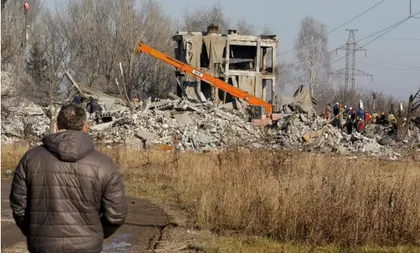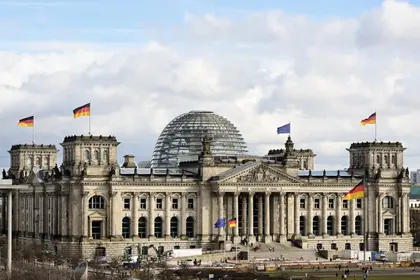One minute after midnight on Jan. 1, American-made HIMAR rockets obliterated a community college in occupied Eastern Ukraine where hundreds of Russian reservists slept atop an enormous cache of stored ammunition.
This was the deadliest single attack of the war thus far, and followed the deaths, two days before, of another 1,470 Russians in Eastern Ukraine. Mounting casualties, and the use of an ammunition depot as a barracks within range of Ukrainian firepower, illustrates Russian incompetence and Ukraine’s military momentum.
JOIN US ON TELEGRAM
Follow our coverage of the war on the @Kyivpost_official.
It embarrassed the Putin regime as Russian military bloggers openly condemned his military leadership.
That same weekend, Ukrainian air defences successfully shot down swarms of Iranian-made suicide drones sent by Russia, then Putin hinted at another mobilization.
Clearly, this war is not stopping anytime soon, which means that 2023 will also be plagued with war-related inflation, commodity shortages, stock market declines, geopolitical tumult, over-borrowing, slow economic growth, and recession, all because of Russia’s crazed absolute dictator.
Economic predictions are gloomy, beginning with one by the International Monetary Fund’s (IMF) chief Kristalina Georgieva who said this year will be worse than last. “Why? Because the three big economies, US, EU, China, are all slowing down simultaneously,” she said in a CBS interview. “We expect one-third of the world economy to be in recession.”

Zelensky: Trump’s ‘Just and Fair’ Rhetoric on Russia Is ‘Exactly What Putin Is Afraid Of’
The U.S. will likely avoid one, but not Europe.
“Half of the European Union will be in recession,” she said. Overall global growth, according to the IMF, will slow to 2.7 percent in 2023 from 3.2 percent in 2022.
China’s deceleration represents another negative impact, alongside the war, but Putin’s weaponization of energy and food prices – two of its biggest exports – has created the greatest global damage.
While higher prices have cushioned Russia somewhat against sanctions and bans, the country’s prospects are abysmal due to a brain drain and flight of foreign capital and talent.
Wall Street and banks are pessimistic, according to Bloomberg.
Britain’s Barclays Capital Inc. believes 2023 will be the worst year economically in 40 years while others say there’s “only” a 65-percent chance of a severe global meltdown. Some, on the other hand, point out that such a bearish consensus may only be as accurate was last year’s bullish consensus about 2022, made before Putin’s invasion on Feb. 24.
Anything can happen.
But it’s safe to assume the following: Cryptocurrencies are wiped out for an indefinite period of time following the spectacular collapse and scandal surrounding FTX and other “exchanges”; the U.S. dollar will drop following its war-related surge; and bonds may improve in value if interest rates ebb. It’s also probable that oil prices will remain flat.

Ticking economic time bomb.
Strangely, global polls among adults are positive.
Some 65 percent of adults believe that 2023 will be better than 2022. This in itself is cause for some optimism, if only because optimistic consumers and investors benefit economies. On the other hand, there are the mega threats outlined by the world’s gloomiest, and often accurate, economist, Noriel Roubini.
“War means more inflation, over-borrowing, debt and a geopolitical `Depression’,” he wrote in Project Syndicate. “Russia’s brutal invasion of Ukraine could still expand and involve NATO. Israel – and thus the United States – is on a collision course with Iran, which is on the threshold of becoming a nuclear-armed state. The broader Middle East is a powder keg. And the U.S. and China are facing off over the questions of who will dominate Asia and whether Taiwan will be forcibly reunited with the mainland.”
“The U.S., Europe, and NATO are re-arming, as is pretty much everyone in the Middle East and Asia, including Japan, which has embarked on its biggest military build-up in many decades. Higher levels of spending on conventional and unconventional weapons (including nuclear, cyber, bio, and chemical) are all but assured, and these expenditures will weigh on the public purse. The Great Moderation is dead and buried; the Great Stagflationary Debt Crisis is upon us.”

Such alarmism aside, most believe that the United States will duck the recession bullet, and that the pandemic problem is ending globally, except in China which refused to vaccinate its populace with proven Western mRNA vaccines.
It’s also a safe bet that China won’t be invading Taiwan anytime soon, given its preoccupation with unwinding its real estate mess, bailing out Belt and Road Initiative projects in poor countries, and being bypassed in supply chains because of its coziness with Putin.
Meanwhile, its neighbors, notably Japan, India, South Korea and others, are re-arming themselves to protect against a rogue Beijing.
On the positive side, squabbling Europe is more cohesive than ever in the face of the Russian threat. Germany and other NATO nations double their security budgets and are permanently disconnecting from Russian fossil fuels and influence.
Relations with the United States remain strong and the world’s fence-sitting middle powers have now stopped playing the West off against the others and become busy scrambling to obtain audiences with leaders in Brussels and Washington.
Of course, there are wild cards. My bet is that Israel’s Benjamin Netanyahu will come down hard on the side of America and the Ukrainian cause by destroying Iran’s drone-making capability.
India will rise in prestige globally as chair of the G20 (or G19 minus Russia) this year. Another important power will continue to be Turkey. It has steadfastly helped Ukraine and NATO and is committed to the de-Russification of Central Asia’s Turkic peoples.
And Saudi Arabia will remain a factor because of its energy dominance, wealth, and alliance with Israel against Iran.

Elon the Superhero President
Of course, no “New Year” forecasting summary is complete without publishing contrarian and even crazy views.
Most outrageous are those by former Russian president and Putin apologist, Dmitry Medvedev. He predicts in coming years: War between Germany and France; an American civil war; the secession of California and Texas; Britain’s renewed membership in the EU which will cause the EU to collapse; and the election of Elon Musk as U.S. president.
He also believes that Germany will create a Fourth Reich consisting of Central and Eastern European vassal nations; oil will hit $150 a barrel; capital will leave the U.S. and Europe and head for Asia; and the Euro and Dollar will crash.
Such prognostications would net a pink slip at a think tank, or a padded cell, but Putin was so impressed that he promoted Medvedev recently to head Russia’s military industry, whatever’s left of it.
The existence of delusional leadership in Russia is both good news and bad news. Overall, it means the country, as currently constituted, will end up in the dustbin of history, as did its equally flawed predecessor, the Soviet Union of Socialist Republics.
And that is the single most welcome prediction of all for 2023.
Diane Francis Newsletter on America and the World
30-day free trial at https://dianefrancis.substack.com/about
Published with the author’s permission.
The views expressed in this opinion article are the author’s and not necessarily those of Kyiv Post.
|
|
You can also highlight the text and press Ctrl + Enter










